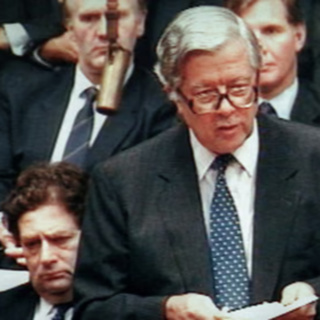
99. Cops and Catholics
The cops are what Robert Peel’s best remembered for. Thanks to him, the world’s first professional, civilian police force was launched. It hasn’t always lived up to initial expectations, with London’s Metropolitan Police going through particularly difficult times just now but, boy, it’s an initiative that has left its mark. And not just in Britain. There was controversy about setting up a police force, with some resisting the idea of paying people to keep an eye on them and make sure they behaved. To libertarians, that felt like an incursion on basic freedoms. But far more controversial still was the extension of political rights to non-Anglican religious groups. First, it was dissident Protestants, and Peel had to change his tune to support their emancipation. But next it was the Catholics, and his U-turn was even more shocking. Nicknamed ‘Orange Peel’ for is backing for the Protestant (Orange) cause, it was astonishing to see him leading the charge for Catholic Emancipation in 1829. But Peel's dramatic changes of view would astonish a lot of people, a lot of times in his career. Illustration: Photograph of a ‘Peeler’ of the 1850s. Public domain (PD-US-expired). Music: Bach Partita #2c by J Bu licensed under an Attribution-NonCommercial-No Derivatives (aka Music Sharing) 3.0 International License
17 Jul 202214min

98. A Conservative Reformer
Reformers were on the move. Elizabeth Fry was notable as a woman speaking out in a man’s world, campaigning for prison reform, especially for women prisoners. But there were many others, notably the Utilitarian philosopher Jeremy Bentham, who found a strange way of having his body dealt with after death. A slightly ghoulish way. But whatever clarion voices campaigned for reform outside Parliament, real change could only come from inside, and specifically from Ministers. And this led to a strange phenomenon: some first steps towards essential reforms being taken by a man whose reputation was as anything but a reformer. He was the new Home Secretary, and he was taking a highly innovative approach to public opinion, one much closer to politicians’ attitudes in our own times. That’s Robert Peel storming back onto the scene. Illustration: The reformer and champion of women prisoners, Elizabeth Fry, by Samuel Drummond, ca. 1815. National Portrait Gallery 118. Music: Bach Partita #2c by J Bu licensed under an Attribution-NonCommercial-No Derivatives (aka Music Sharing) 3.0 International License
10 Jul 202214min

97. The times they are a'changing
That poor, saintly William Wilberforce. He’d spoken with such courage and dedication for the slaves for so long. And yet now, with a more radical movement emerging championing the poor and oppressed in Britain itself, he found himself the target of hostile attack. Aging and with his health going, He withdrew from public life in 1825. Meanwhile, Canning was back in government, serving under Lord Liverpool, who was endeavouring to deal with the difficulties of the time. Above all, they were caused by the growing hardship suffered by the poor, and this episode looks briefly at some of the economic factors that were making things worse. That just added fuel to the fire of the Radicals, who were demanding action to improve the lives of British workers, whose poverty could hardly be justified in the nation with biggest economy per capita in the world. Essentially, that would determine the battle lines in politics for the next two decades: parliamentary reform, to give the underprivileged a greater voice, and the end of the Corn Laws, which served great landowners well but kept food prices high. Illustration: William Cobbett, by John Raphael Smith, engraved 1812. Note the portrait behind him of John Hampden, the great leader of the resistance to Charles I in the seventeenth century, also an icon for the American rebels in the eighteenth. National Portrait Gallery 6870 Music: Bach Partita #2c by J Bu licensed under an Attribution-NonCommercial-No Derivatives (aka Music Sharing) 3.0 International License
3 Jul 202214min

96. Scandals galore
A scandalous episode: first the king trying to divorce his wife and a major domestic row developing between them, all conducted in public, with armed guards and slammed doors to exclude the Queen from her husband's coronation. Wonderful proof that the Royal family’s gift for generating bad publicity, and entertaining the population with it, is nothing new. Next, a repressive government is met by an attempt at armed revolt, leading to public executions enjoyed by a crowd of thousands. And finally, driven by overwork and mental illness, a much-maligned giant of the political world puts an end to it all. Three scandals in one episode. Who could ask for more? Illustration: The Trial of Queen Caroline 1820, by Sir George Hayter, 1820-1823. National Portrait Gallery 999 Music: Bach Partita #2c by J Bu licensed under an Attribution-NonCommercial-No Derivatives (aka Music Sharing) 3.0 International License
26 Jun 202214min

95. Calicoes, Competition and Condescension: British rule in India
Popular belief, back in the nineteenth century and also today, was that the British Empire in India may have been flawed and imperfect, but it set out to benefit the native peoples. In this episode, we take a look at that belief, and find that actually it did a great deal of damage, that the benefit it might have produced was already being pursued by local figures who might have got a lot further left to their own devices, and that it deliberately sacrificed Indian economic interests for the sake of British ones. Nowhere was that truer than in the cotton industry. Illustration: Man's Indian Calico robe from the late seventeenth century. Metropolitan Museum of Art, New York: http://metmuseum.org/Collections/search-the-collections/140005504 Music: Bach Partita #2c by J Bu licensed under an Attribution-NonCommercial-No Derivatives (aka Music Sharing) 3.0 International License
19 Jun 202214min

94. Pete, Dave and Bobby
Pete, Dave and Bobby are the subjects of this episode. But Pete’s a place not a person. It’s St Peter’s Field near Manchester, site of one of those epoch-shattering, and epoch-shaming, events that would mark British politics for the next decade or more. Dave is another in the series of remarkable economists that started with Adam Smith. Apparently, he was also rather a nice guy. As for Bobby, he was a new breed of politician, from a new class to produce leaders for Britain, and someone we’ll be hearing a lot more about in future episodes. Illustration: Engraving depicting the Peterloo Massacre, by Richard Carlile. Public domain. Music: Bach Partita #2c by J Bu licensed under an Attribution-NonCommercial-No Derivatives (aka Music Sharing) 3.0 International License
12 Jun 202214min

93. A Peace of Kings
The Congress of Vienna set up peace in Europe for decades. Indeed, it prevented any kind of general war across the whole of the Continent for nearly a century, until the First World War broke out in 1914. But it wasn’t quite as straightforward as the outcome might suggest. The power of Russia, with 600,000 troops now occupying many parts of Europe, led to a quick rehabilitation of the former enemy, France. And some very clever diplomatic work, by the remarkable trio of the French Foreign Ministers of France, Talleyrand, Austria, Metternich, and Britain, Castlereagh, proved necessary to put the Russian bear back in his box. The other aspect of the Congress is that what it ushered in was a Peace of Kings. Ideas thrown up by the French Revolution, of the rights of man, of popular sovereignty, of equality between citizens, were decidedly out of fashion. Which was going to prove problematic in a Britain facing harsh conditions and growing discontent. Illustration: The Russian Bear inspired fear in the west: Tsar Alexander I published by Colnaghi & Co on 2 May 1814. National Portrait Gallery D15858 Music: Bach Partita #2c by J Bu licensed under an Attribution-NonCommercial-No Derivatives (aka Music Sharing) 3.0 International License
5 Jun 202214min

92. We meet our Waterloo
Napoleon makes his second bid for power, and comes unstuck, as Wellington and Blücher prove too much for him at Waterloo. It’s a victory the Brits like to celebrate as a great triumph for the country, up on a par with Trafalgar ten years earlier. The truth, though, is that even within Wellington’s army, there were more Germans than Brits. And, when you add in Blücher’s Prussians, Napoleon’s defeat owed far more to German soldiery than to British. Though Wellington’s generalship, alongside Blücher’s, was a crucial factor. The Iron Duke stood firm. Just as the old man Blücher kept his word and came to his aid, personally leading his troops, despite his advanced age and his injuries. Between them, they finished Napoleon's rule. Illustration: A British infantry square withstanding cavalry attack. Elizabeth Thompson, The 28th Regiment at Quatre Bras. This work is in the public domain including in the United States, because it was published (or registered with the U.S. Copyright Office) before January 1, 1927. Music: Bach Partita #2c by J Bu licensed under an Attribution-NonCommercial-No Derivatives (aka Music Sharing) 3.0 International License
29 Mai 202214min





















